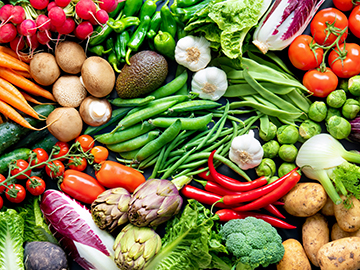Protecting natural resources is a major priority and challenge for all organizations.
We have been working with our clients, suppliers and partners as well as the World Wildlife Fund (WWF) to measure and reduce our carbon emissions, both direct and indirect, since 2010. We’ve set ourselves the goal of reducing our carbon emissions by 34% by 2025 (compared to 2017 level), which was approved by the Science-Based Target initiative (SBTi) in 2019. We have become the first company in the Foodservices sector to have a carbon target in line with the Paris Agreement objective of limiting climate warming to 1.5°C.
Preventing and reducing food waste
To effectively fight food waste and have a decisively positive impact, a concerted effort is needed from all players in the food chain. Reducing food waste is a major way we can reduce our direct emissions and we are the first Foodservices firm to have linked part of our financing to this goal.
We have committed to the ambitious target to halve our food waste as a company by 2025 (vs. 2019 level). We are launching more and more initiatives, both international, such as WasteLESS Week, and local, like Wasteful to Tasteful at 200 sites in the United Kingdom. We are continuously training our teams to constantly strive to reduce food waste and, as of August 31, 2021, in the 900 sites where our WasteWatch program is deployed, the reduction in food waste an average of 45.8%.
Promoting sustainable food choices
In addition to the health benefits for consumers, a varied, sustainable and plant-forward diet is also a way to significantly reduce carbon emissions.
We help to raise our consumers’ awareness of the environmental impact of their food choices, and encourage them to eat differently by offering sustainable dishes and tasty plant-based options. For instance, an Ecoscore rating is now provided with each dish prepared by FoodChéri, the first player in Foodservices in France to make such a commitment in response to environmental issues.
Increasing local and responsible procurement
Because almost half of our carbon emissions are linked to our supply chain, we are committed to promoting sustainable and local agriculture, co-developing products and services based on circular economy principles and improving the efficiency of our resources.
Since deforestation is the main cause of climate change and biodiversity loss, we have committed to eliminating products that contribute to it from our supply chain by 2030. To achieve this we are, in partnership with the WWF, increasing the percentage of products procured which are certified deforestation free and focusing our efforts on those with the greatest impact, namely beef, soy, palm oil and paper. We have also opted to eliminate plastic take-out bags, straws, plates, cutlery and coffee stirrers, replacing them with new and more sustainable versions made of paper, cardboard, wood or fiber.
Promoting innovative energy solutions
We have committed to ensuring that by 2025, 100% of the electricity we use at our self-operated sites will be renewable, and we aim to encourage our clients to also adopt this goal by using our complete energy management services. These services, which, by definition, include an energy strategy, upgrading for compliance, and the supply, monitoring and implementation of technologies designed to improve energy efficiency, have already allowed client companies to achieve annual savings and obtain significant returns on their investments.
Focusing on reducing indirect emissions
The results of this active strategy in terms of climate impact are very clear. Since 2017, we have reduced our Scopes 1 and 2 carbon emissions by 37.2% and Scope 3 supply chain by 23.2%. Having made tangible progress in terms of direct emissions (Scopes 1 and 2), we are now focusing our efforts on reducing indirect emissions (Scope 3).
Read more in the



